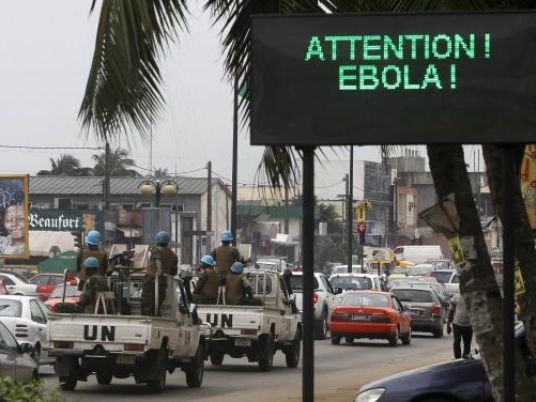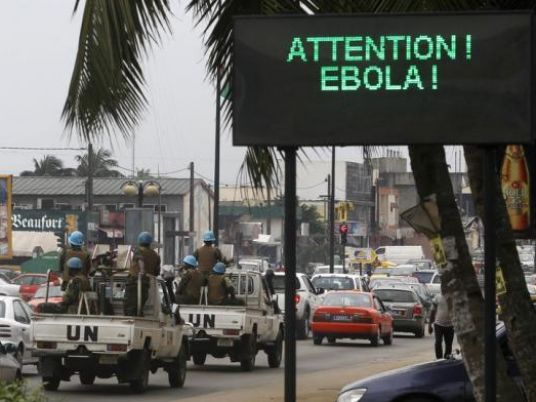
A few days ago, the World Health Organization (WHO) declared that Ebola viral disease outbreak is moving too fast to be adequately controlled with a death toll of 1,013 people and 1,848 infected across West African nations.
The figures seem startling as the virus has spread widely in a very short period of time in Africa, not too far from Egypt.
The Egyptian Healthy Ministry has released a statement saying that several precautionary measures have been taken to follow up daily on the international status of the epidemic.
The Abbaseya fever hospital has been allocated for any cases suspected or confirmed to be infected with the virus and Health Minister Adel al-Adawy stressed that a committee has been formed to take necessary actions and draw plans to keep the virus away.
Can Egypt stay Ebola-free?
From the governmental side, Adawy has emphasized that Egypt is Ebola free, but for how long?
“Yes, so far, Egypt is Ebola-free, but actually the virus is not far,” Islam Hussien at Massachusetts Institute of Technology (MIT) told Egypt independent.
The Egyptian physician who studied virology in the University of Cambridge explained that the epicenter of the current outbreak is located in three West African countries: Guinea, Sierra Leone and Liberia, with a recent spillover into Nigeria.
“While it might sound like a remote threat for Egypt, actually it isn’t because Cairo is only one flight away from the badly hit countries,” he said.
Hussien added that last month, a Liberian government official named Patrick Sawyer, who contracted Ebola while visiting his sick sister, boarded a flight to Lagos in Nigeria. He fell ill while on board, died shortly after arrival and transmitted the disease to more than 10 people either directly or through his contacts while being treated at a Nigerian hospital.
It can take up to three weeks for the overt disease symptoms to show up. An infected person incubating the virus, without showing any symptoms could very well be on his way to Cairo at any moment of time.
Steps to prevent Ebola in Egypt
Hussein emphasized that Ebola is a disease that thrives off poverty, lack of understanding and malfunctioning healthcare systems. These are exactly the reasons why the ongoing outbreak is spiraling out of control in the three affected West African countries.
The Ebola virus doesn’t spread easily; it needs direct contact with body fluids from infected patients. Transmission occurs only when patients are symptomatic.
So, in theory, it can be easily contained via strict isolation of infected patients in healthcare facilities specially designed for that. Only one mishandled Ebola case can potentially initiate a huge outbreak, which doesn’t only come with a high fatality rate from 60 to 90 percent, but also with severe economic consequences.
Hussein explained how the Health Ministry can help protect the public from an Ebola outbreak. “Several layers of protection and precautionary measures are available,” he said.
Suspending flights completely from the outbreak countries, Hussein said, is always an option that has been already taken by some airlines. However, such decision might hinder the movement of travelers who are visiting those countries with the purpose of fighting the outbreak. In the case of continued air traffic, screening of passengers arriving at portals of entry is essential.
He added that any case of high fever or unexplained illness must be investigated thoroughly. Early Ebola symptoms can be easily confused with so many other illnesses. Therefore, investigating a suspicious case in the absence of appropriate diagnostic tests can be very challenging.
Hussien stressed on the necessity of providing at least one local laboratory that has Ebola testing capability without the need to ship samples abroad.
Hussien added that screening of incoming passengers for apparent illness isn’t enough because there is a chance that somebody could be incubating the virus without showing any symptoms. Therefore, establishing a system for tracking those passengers is necessary in order to make sure that they don’t develop any signs of illness within a period of three weeks.
“In the worst-case scenario of having receive an Ebola case [in Egypt], there is no reason to panic if we have healthcare facilities equipped with proper isolation units and trained physicians,” he said.
He pointed that standard infection control measures, if rigorously applied, are sufficient to break the disease transmission chain and reduce any potential losses. Last but not least, educating the public, and healthcare workers in particular, is crucial for any Ebola preparedness plan.
*Correction: A section where a scientist quoted to MENA that the Ebola virus had evolved to a respiratory disease was removed as it did not coincide with other reports.



